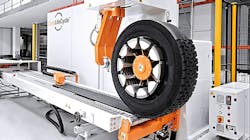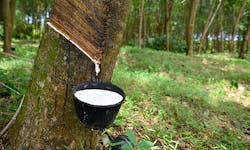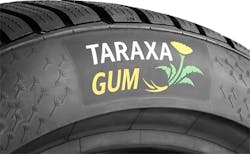To help meet its “Vision 2030” goals, Continental’s Tire business has put all of its sustainability activities, from rubber sourcing to retreading, into a new department. Claus Petschick, who has worked at the tire manufacturer for 30 years, has been named head of sustainability and will oversee the department. For the previous decade Petschick was vice president of quality management.
"With the creation of a dedicated sustainability organization under the leadership of Claus Petschick, we are consolidating our far-reaching activities and research projects and underscoring our commitment to further systematic expansion of sustainable business models and innovative products and services along the entire value chain,” said Christian Kötz, head of the tires business area and member of the Executive Board of Continental AG. “We are confident that sustainable and responsible management enhances our capacity for innovation and our future viability, and that we can make an important contribution to society and toward shaping our future through our commitment.”
The four areas of focus include climate change mitigation, clean mobility, circular economies, and sustainable supply chains, and Continental said the United Nations’ sustainable development goals guide the framework. The ultimate target is 100% climate neutrality by 2050, with renewable electricity in all plants by the end of 2020 and CO2-neutral production by 2040 as milestones.
Research and development in sustainability led to the creation of the ContiLifeCycle plant in Hanover, Germany, in 2013, where high-tech equipment is deployed to increase the efficiency of tire recycling. Because recycling and retreading are done in the same building, raw material from recycled tires can be used in production of new and retreaded ones.
The tire industry consumes 70% of the global demand for natural rubber, with deforestation and land usage a serious problem for developing nations such as Sumatra and Cambodia. One 2015 study "projected rubber demand could require another 4.3-8.5 million hectares of land by 2024." Continental is a founding member of the Global Platform for Sustainable Natural Rubber, which aims to create a rubber supply chain that will help ravaged ecosystems bounce back after nearly two centuries of wanton harvesting. Just about any global company involved with tires is also a member. The main benefit is that sustainable breakthroughs are shared between members, in the same way that safety best practices are shared between trucking competitors.
Recent innovation in sourcing rubber also shows promise. In 2018, the company opened the Taraxagum Lab Anklam to convert Russian dandelion root into usable rubber for tires as a replacement for rubber trees in Southeast Asia. If the project is successful, within 10 years commercial vehicle tires could use the abundant flowering weed as raw material. Currently, Continental has commercialized the method to manufacture the Urban Taraxagum bike tire.
Another area brought into the new department is the open-source Cokoon rubber adhesive technology that replaces formaldehyde and resorcinol as the active chemical in bonding textile reinforcing materials to the surrounding rubber matrix. Continental and Kordsa began the project in 2017. As of February 2020, 250,000 tires using the eco-friendly dip were in production.
About the Author
John Hitch
Editor
John Hitch is the editor-in-chief of Fleet Maintenance, providing maintenance management and technicians with the the latest information on the tools and strategies to keep their fleets' commercial vehicles moving. He is based out of Cleveland, Ohio, and was previously senior editor for FleetOwner. He previously wrote about manufacturing and advanced technology for IndustryWeek and New Equipment Digest.




